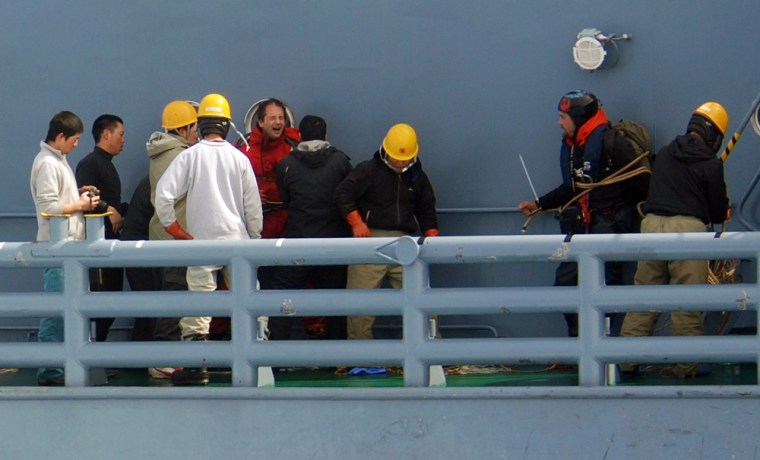An Australian vessel on Friday picked up two activists who had jumped on board a Japanese whaling ship earlier this week, prompting a tense standoff on the high seas.
Their return paves the way for the Japanese crews to resume killing whales, and for their staunchest opponents to restart their campaign of harassment to stop them.
Paul Watson, head of the Sea Shepherd Conservation Society, said the two crew members were safely back on board the group's ship, the Steve Irwin.
The activists from an anti-whaling group, the Sea Shepherd Conservation Society, had been detained on the Japanese harpoon boat Yushin Maru 2.
The dispute underscored the high-stakes nature of the contest fought each year in the remote and dangerous seas at the far south of the world, thousands of miles from the possibility of regular emergency or rescue services.
At issue is Japan's foray into the Antarctica in November under a program that allows the killing of minke and fin whales for scientific research, despite an international ban on commercial whaling. Opponents say Japan has used the loophole to kill nearly 10,000 whales over the past two decades and sell their meat on the commercial market.
Activist claims he was nearly tossed overboard
Sea Shepherd said Australian Benjamin Potts, 28, and Briton Giles Lane, 35, wanted to deliver an anti-whaling letter and then leave, and accused the whalers of taking their members hostage Tuesday. Japanese whaling officials said the activists were acting like pirates.
The standoff brought Japan's whaling fleet to a temporary standstill while officials worked out the details of the men's transfer.
Potts on Friday accused the whalers of trying to throw him overboard, saying he struggled and managed to stay aboard.
"Two guys picked me up by the shoulders, and the gunner, the guy that shoots the whales, picked my legs up and they attempted to tip me over," Potts told the Fairfax radio network by phone from the Steve Irwin.
Gabriel Gomez, spokesman for the Institute of Cetacean Research that organizes Japan's hunts, said it was "absolutely untrue that the Japanese crew assaulted the two, or tried to throw them overboard."
He said the crew briefly tied up the two intruders because they had no idea of their intentions when they jumped aboard.
Foreign Minister Stephen Smith said Australian police were investigating complaints in connection to the incident to determine if any laws had been broken.
Gomez said whaling was expected to resume within days, and accused Sea Shepherd activists of launching an attack with bottles of acid on another harpoon boat, the Yushin Maru 3, four hours after the hand-over.
More harassment promised
Watson, captain of the Steve Irwin, said he would resume aggravating the whalers, though it was unlikely members of his crew would again try to board one of the Japanese fleet.
"We have got them back without any conditions and now we are going to continue on harassing and chasing the Japanese fleet," Watson said.
"They are down here illegally killing whales, illegally targeting endangered species ... These people are no different than elephant poachers in Africa or tiger poachers in India," Watson had told the Australian Broadcasting Corp. earlier.
A staunch anti-whaling nation, Australia sent the Oceanic Viking to the Antarctic Ocean last month to collect photo and video evidence that might be used in international courts to prove that the program is a front for commercial whaling.
